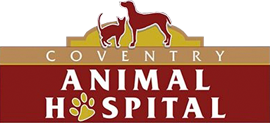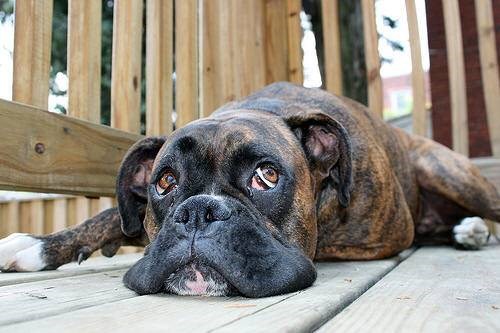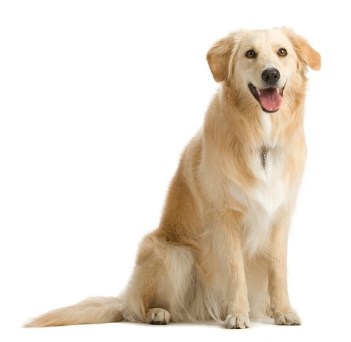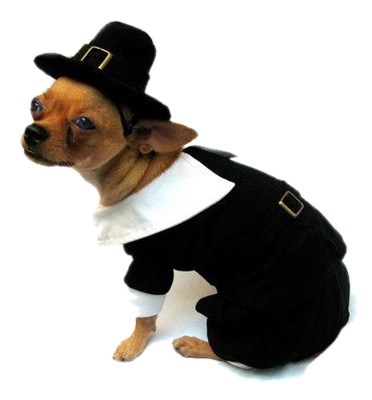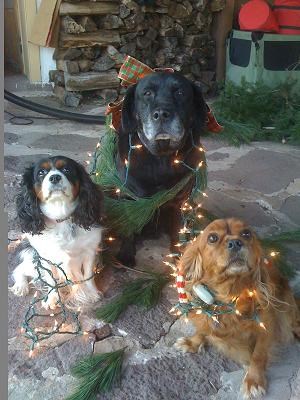Christmas 2011 - The Tale Of Three Not-So-Wise Bird Dogs!
12/25/2014
Hopefully you and your pets navigated the Thanksgiving holiday without incident. Congratulations to those that did, and for those that did not, here's a second chance. It is now time to pet-proof the halls for the onslaught of the December holidays!!
There are many holiday hazards to avoid. Below is a list of the biggest....
~ "Christmas Tree, O Chirstmas Tree...." This represents the mother of all hazards wrapped into one! Light strands and cords can cause electrocution if chewed. Tinsel can be swallowed and become lodged in the GI tract causing vomiting at best and requiring surgery at worst. Tree water is universally loved by dogs and cats alike so be cautious of any additives put into the tree water. Some animals have been known to pick low-lying ornaments off of the tree to snack on. My Cavalier Emma "customized" many ornaments during her first Christmas. We commemorated the event by making her vomit ornament remnants. Although she thankfully was fine in the end, she could have gotten herself into BIG trouble. Finally, cats love to climb trees so be sure that the tree is firmly attached in the stand to the floor.
~ "Chestnuts Roasting On The Open Fire...." The open fire is the issue here to be watched. Candles are easily toppled and can burn pets as well as potentially sparking fires. Wood stoves are hot to the touch and will burn noses and paws if access is not restricted.
~ ...Visions of Sugarplums...." As discussed in the Thanksgiving Day issue, many foods intended for human consumption create problems when ingested by our pets. Please avoid feeding turkey, ham, raisins, grapes, and chocolate of any kind. And be aware of where holiday goodies are being kept - my Cavalier Duke was seen on the kitchen table last year helping himself to an undisclosed number of chocolate chip cookies. We had to make him vomit to be sure he did not end up with chocolate toxicity. Although anything in moderation can be tolerated, a better option is to avoid all of the above and make or buy pet-appropriate treats and stocking stuffers.
~ "The Stockings Were Hung...." Keep these up and out of the way! Last Christmas before the stockings were hung with care, my Lab Layla decided to eat her entire stocking - and it was empty. We had to make her vomit to get the stocking out of her stomach before it created an obstruction ( if you are keeping track, this is the final of three that I had to make vomit during Christmas 2010 ). Keep these out of reach, especially if full of treats or toys. Pigs ears, hooves and rawhides are safety issues if swallowed whole. Stuffed animals can be dismantled and eaten quickly so supervise play and discard or repair any amputations.
~ "Grandma Got Run-over By A Reindeer...." Actually all relatives, not just Grandma, are NOT to be trusted! They will feed your pets from the table and leave their guest room door open so that your dog can eat their socks & underwear and their prescription meds. Once the damage is done, they skip town leaving you holding the bag.
I'm sure that there are a few things that I have forgotten, but this hits the biggies. In summary, the best defense is a good offense. Establishing a few family ground rules and a safe zone will go a long way to insuring that you have a Merry Christmas and a Happy New Year!
Feliz Navidad from Rich Marchetti VMD, and all of the rest of us at Ludwigs Corner & Coventry
ps -seasons greetings from Layla, Duke and Emma - the "bad" Marchetti kids. We hope that you learn from our misadventures :)


